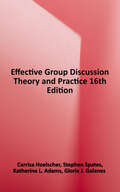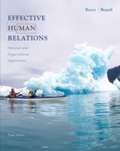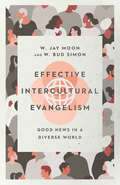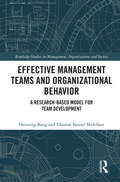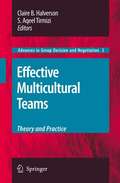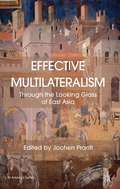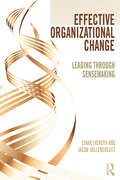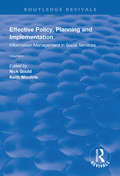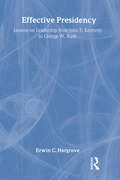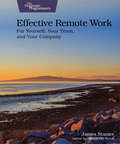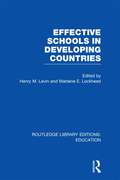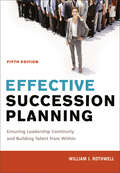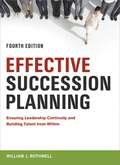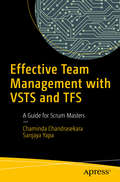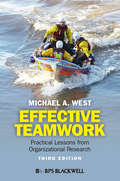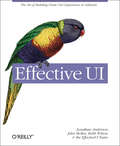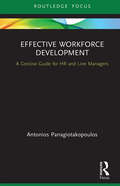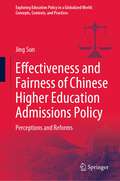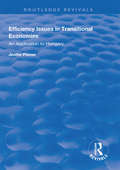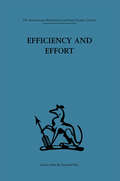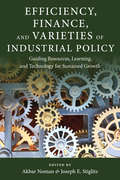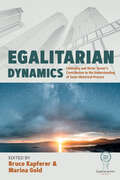- Table View
- List View
Effective Group Discussion: Theory and Practice
by Katherine L. Adams Carrisa Hoelscher Stephen Spates Gloria J. GalanesNow in its sixteenth edition, Effective Group Discussion combines the most recent research findings and practical tools students need to become productive group members. The text covers various secondary groups: work groups, committees, task forces, self-directed work teams, and other small groups whose objectives include finding solutions to problems, producing goods, and creating policies.
Effective Human Relations: Personal and Organizational Applications
by Barry L. Reece Rhonda BrandtThis comprehensive text covers the key human relation skills students need to be successful managers in the workplace. Ideal for both two- and four-year programs, Effective Human Relations uses an organizational perspective to help students understand the disparate factors that influence employee behavior. The Tenth Edition focuses more directly on chapter objectives, establishing them around the seven themes of the text--communication, self-awareness, self-acceptance, motivation, trust, self-disclosure, and conflict resolution--so that the students absorb and connect the concepts. New areas of coverage include goal-setting principles; root causes of negative attitudes; introduction of the Reiss Profile instrument used to classify our basic desires; the use of "branding" to achieve greater visibility in a crowded job market; discrimination based on a person's religious preference; new ways to classify various forms of technostress; and new support for the importance of emotional intelligence. Throughout the text, major themes are supported by a multitude of real-world examples and emotional intelligence checkpoints.
Effective Intercultural Evangelism: Good News in a Diverse World
by W. Jay Moon W. Bud SimonWe live in a multicultural society. But Christians often do not know how to engage those of other faiths. As a result, many Christians hesitate to talk about Christianity with others in any kind of evangelistic way. Jay Moon and Bud Simon unpack the intercultural dynamics that Christians need to understand when encountering people from different communities and cultural backgrounds. Regarding evangelism from the perspective of four major worldviews (guilt/justice, shame/honor, fear/power, and indifference/belonging with purpose), this book demonstrates contextual evangelism approaches that are relevant, biblical, and practical. The authors draw on new research conducted with hundreds of participants that reveal concrete ways to communicate the gospel effectively across cultures. Sharing one's faith does not require attacking other religions; rather, we can engage at the worldview level in order to address people's deepest concerns. Greater understanding provides us with better skills for relational connection, empathy, and effective witness.
Effective Management Teams and Organizational Behavior: A Research-Based Model for Team Development (Routledge Studies in Management, Organizations and Society)
by Henning Bang Thomas Nesset MidelfartMost contemporary organizations use management teams to manage and coordinate their businesses at all levels of the organizational hierarchy. Management teams typically set overall goals, strategies, and priorities, making vital organizational decisions. They discuss issues, solve problems, offer advice, and ensure various processes and units are aligned and interact efficiently. Although management teams are vital for overall organizational performance, research indicates that they are largely underused and less effective than their potential would suggest for value creation. This book provides a research-based and practical model of the characteristics of effective management teams. It looks in depth at each factor of the model, discusses the supporting research, provides examples of how the factors influence the work and effectiveness of management teams, and shares tips and tools for successfully working with management team development. It provides researchers, academics, and students of organizational behavior with an overview of the variables that empirical research has found to be robustly related to management team effectiveness and will enable leaders and management consultants to develop more effective management teams.
Effective Multicultural Teams: Theory and Practice
by Claire B. Halverson S. Aqeel TirmiziMulticultural and multinational teams have become an important strategic and structural element of organizational work in our globalized world today. These teams are demonstrating their importance from the factory floors to the boardrooms of contemporary organizations. The emergence of multicultural teams is evident across a variety of organizations in the private, public, and civil society sectors. These developments have led to an increasing interest in the theory and practice of multicultural teams. Management educational and training programs are giving increasing attention to these developments. At the same time, there is emerging interest in research about and study of multicultural teams. This book emerged from our teaching, research, and consulting with multicultural and diverse teams in multiple sectors over the last several years. In particular, we have developed and refined our ideas about the concepts in this book from teaching an advanced course called Effective Multicultural Teams in the Graduate Program at the School for International Training (SIT) in Vermont. We have learned from the rich background of students who are from, and have worked in, six contents, and who are, or plan to be, working in the public, educational, not-for-profit, and for-profit sectors. Additionally, we have engaged with a variety of teams through our consulting and training, providing consultation to teams in a variety of sectors and continents as they struggled to become more effective.
Effective Multilateralism
by Jochen PrantlExisting theories of cooperation assume a stable geo-political order, led by countries with a shared conception of the modalities of cooperation. These assumptions are no longer justified. Effective Multilateralism makes the case for a new approach to explaining international cooperation through the lens of East Asian.
Effective Organizational Change: Leading Through Sensemaking
by Einar Iveroth Jacob HallencreutzOrganizations are constantly evolving, and intelligent leadership is needed during times of transformation. Change leaders must help people become aware of, understand and find meaning in the new things which arise — they must oversee a sensemaking process. Addressing this need, Effective Organizational Change explores the importance of leadership for organizational change based on sensemaking. Combining a theoretical overview, models and conceptual discussions rich with in-depth examples and case studies, this book uncovers what it is that leaders actually do when they lead change through sensemaking. It presents the most current sensemaking research, extends earlier work by developing the concept of ‘landscaping’, and provides guidelines on how leaders can drive sensemaking processes in practice. This book is for undergraduate, postgraduate and MBA students of organizational change, as well as managers embarking on change projects within their organizations.
Effective Policy, Planning and Implementation: Volume 2: Information Management in Social Services (Routledge Revivals)
by Nick Gould Keith MoultrieFirst published in 1997, in this second volume Gould and Moultrie compile writings from various professionals in the public service sector, researchers and other academics in support of the Social Services Research and Development Unit (or SSRADU) at the University of Bath. Primarily focusing on three points of research: In retrospect, the lessons learnt form implementing information systems in to address specific needs of the social service organisation. Different processes that can successfully identify the major information needs of the late 1990s, encompassing efficient and relevant information to inform social service planning. Finally, the management of information in social services in a national and international context.
Effective Presidency: Lessons on Leadership from John F. Kennedy to George W. Bush
by Erwin C. HargroveEvery four years the American public goes to the polls in hopes of electing a hero to the presidency, trying to find someone larger than life. But heroes are hard to find and sometimes they turn out to be villains. Senior presidential scholar Erwin Hargrove recommends that we shift our sights to electing an effective president instead, and here he shows us how to assess effective presidencies. To address the central question of whether presidents make a difference, Hargrove asks about the most important things each president attempted. He finds that much of the time, "eventful" leadership prevails, but that some presidents may be judged to be "event-making" for good or ill. As George W. Bush has demonstrated, event making leaders run great risks-sometimes challenging the Constitution-even as they attempt greatness. By contrast, effective presidents combine eventful leadership with a modulated sense of personal ambition. Hargrove examines this winning combination in light of historical context and a fine gauge of personal skills and attributes. Reviewing eventful and event-making presidencies of the last fifty years, Hargrove comes down on the side of effectiveness over the special effects of pyrotechnic presidencies like the current one.
Effective Remote Work: For Yourself, Your Team, And Your Company
by Dr James StanierThe office isn't as essential as it used to be. Flexible working hours and distributed teams are replacing decades of on-site, open-plan office culture. Wherever you work from nowadays, your colleagues are likely to be somewhere else. No more whiteboards. No more water coolers. And certainly no Ping-Pong. So how can you organize yourself, ship software, communicate, and be impactful as part of a globally distributed workforce? We'll show you how. It's time to adopt a brand new mindset. Remote working is here to stay. Come and join us. Remote working is on the rise. Whether or not we are remote workers, it is likely we are all part of a global workforce. We need to learn to interact remotely, because we are all remote from someone in some way. Rather than simply simulating the way we'd usually work together via digital means, we have to learn new communication skills and adopt a different mindset in order to work remotely effectively, efficiently, and, most importantly, healthily.We'll start by getting you set up with the right equipment and habits. Then, we'll learn the mindset of treating everyone as remote, and conquer both synchronous and asynchronous communication. You'll learn how to produce amazing artifacts, how to communicate clearly, and how to manage yourself and your teams. Then we'll look at the bigger picture: from measuring the remote readiness of your workplace, to creating a handbook for your team, to exploring remote-first culture and tackling burnout and mental well-being.Fundamentally we'll see that adopting a remote-working mindset can do wonders for our organization, our effectiveness, and our impact in our careers. It can even create a more diverse and inclusive industry for us all to work in.So what are you waiting for? The remote future is now. Be a part of it.What You Need:There are no prerequisites to reading this book, other than having had some experience of working in the software industry and a healthy curiosity.
Effective Schools in Developing Countries (Routledge Library Editions: Education #Vol. 15)
by Henry M. LevinThis volume brings together eight case studies which describe a variety of initiatives to create more effective schools for children of poverty, especially in the Third World. The initiatives reviewed published and unpublished documents and both qualitative and statistical studies were examined. Countries include Brazil, Burundi, Colombia, Ghana, Nepal, Sri Lanka, Thailand and the United States. Each initiative was developed independently to address unique challenges and situations but taken as a group, the features of the approaches described in this volume can be viewed as a basis for considering the development of effective schools strategies in other contexts.
Effective Succession Planning: Ensuring Leadership Continuity and Building Talent from Within
by William J. RothwellOrganizations that don&’t take steps to address future talent needs at all levels will face some major obstacles when undervalued key employees get burned out and leave you to fend for yourself.Nobody likes to lose good employees. But sometimes the loss of a key employee can be disruptive to the business at best, and completely disastrous at worst. The most comprehensive book on the subject, the fifth edition of the bestselling Effective Succession Planning covers every base of how to address future talent needs before a crisis hits, including how to:Identify competencies and clarify organizational valuesPlan for and quickly fill crucial vacancies at all levelsDevelop and retain top talentAssess current needs and future resources for seamless succession planningUpdated with current best practices, trends, and technology, the latest edition also includes: succession planning for small businesses and nonprofits; replacement planning; transition management; downsizing; international issues; mergers and acquisitions as a talent strategy; and succession planning for technical positions as well as roles built on longstanding social relationships.Don&’t risk the loss of your most valued employees and their accumulated wisdom and experience that has been key to your company&’s success for many years. Effective Succession Planning is your go-to indispensable guide for avoiding the catastrophe that losing them would bring.
Effective Succession Planning: Ensuring Leadership Continuity and Building Talent from Within
by William RothwellWilliam Rothwell honored with the ASTD Distinguished Contribution Award in Workplace Learning and Performance. The definitive guide to a timely and timeless topic-- now fully revised and updated. As baby boomers continue to retire en masse from executive suites, managerial offices, and specialized or technical jobs, the question is—who will take their places? This loss of valuable institutional memory has made it apparent that no organization can afford to be without a strong succession program. <P><P>Now in its fourth edition, Effective Succession Planning provides the tools organizations need to establish, revitalize, or revise their own succession planning and management (SP&M) programs. The book has been fully updated to address challenges brought on by sea changes such as globalization, recession, technology, and the aftereffects of the terror attacks. It features new sections on identifying and assessing competencies and future needs; management vs. technical succession planning; and ethics and conduct; and new chapters on integrating recruitment and retention strategies with succession planning programs. This edition incorporates the results of two extensive new surveys, and includes a Quick Start guide to help begin immediate implementation as well as a CD-ROM packed with assessments, checklists, customizable guides, and other practical tools.
Effective Team Management with VSTS and TFS: A Guide For Scrum Masters
by Chaminda Chandrasekara Sanjaya YapaGain the essential knowledge to use VSTS/TFS effectively to empower your Agile teams. This book provides a deep analysis into issues Agile teams may face and how to overcome them by adopting and implementing the proper tools.Rather than just review VSTS/TFS features, this book provides proven solutions to the challenges in building better Agile teams. You'll see how to handle small teams and how to facilitate large teams to support large scale projects. You'll also learn to work with distributed teams in different geo locations, which will deepen your ability to get successful project/product outcomes from your teams. Special focus is given to creating long term sustainability to effectively manage a backlog/portfolio backlog. You'll explore how to work with stakeholders closely to better understand a project's requirements and review how to perform the post execution analysis and planning for next development cycle and forecasting.What You'll LearnHandle large teams and distributed teams with VSTS/TFS.Run Agile team functionsReview requirements to delivery traceability, with visibility and accountabilityOvercome challenges and avoid common pitfalls with Agile teamsWho This Book Is ForScrum masters, project managers, team leads, Agile team members or anyone who handles and involves in the enterprise software delivery process.
Effective Teamwork
by Michael A. WestUpdated to reflect the latest research evidence, the third edition of Effective Teamwork provides business managers with the necessary guidance and tools to build and maintain effective teamwork strategies.A new edition of a bestselling book on teamwork from an acknowledged leader in the fieldOffers a unique integration of rigorous research with practical guidance to develop effective leadership teamsFeatures new chapters on virtual teams and top management teams, plus contemporary themes of ethics and valuesUtilizes research based on positive psychology techniques
Effective UI: The Art of Building Great User Experience in Software
by Jonathan Anderson John Mcree Robb Wilson The EffectiveUI TeamPeople expect effortless, engaging interaction with desktop and web applications, but producing software that generates enjoyable user experiences is much harder than many companies anticipate. With Effective UI, you'll learn proven user-experience strategies that will satisfy your clients and customers, drive business value, and increase brand strength. This book shows you how to capture the collaborative and cooperative spirit among designers, engineers, and management required for building engaging software. You'll also learn valuable methods for maintaining focus throughout the process -- whether you're a product manager who needs a clear roadmap, a developer or designer looking for guidance and advocacy, or a businessperson who wants to understand and manage user-experience software initiatives. Learn how to build software that will:Generate engaging and interactive experiences between consumers and businesses, or between businesspeople and their information systems Account for how people work with, think about, and consume information Establish a richer means of collaboration and communication Reduce frustration by streamlining complex tasks and creating processes that are more intuitive Distinguish products, services, and brands to create a competitive advantage Create scalable systems that adapt to changing user needs and behaviors
Effective Workforce Development: A Concise Guide for HR and Line managers (Routledge Focus on Business and Management)
by Antonios PanagiotakopoulosDeveloped for busy HR practitioners and trainers, this book provides a concise guide to the theory and practice of employee training in contemporary organizations. Reflecting the importance of employee development to learning-based organisations in the knowledge economy, it clearly links employee training needs to business development and offers an accessible guide to current theories combined with research-based practical guidance in how to design effective training programs. Covering all the current theories about training and development and the latest thinking about workplace learning interventions, this concise, practical guide will be an essential source for HR practitioners and line managers seeking improve organizational learning and performance.
Effectiveness and Fairness of Chinese Higher Education Admissions Policy: Perceptions and Reforms (Exploring Education Policy in a Globalized World: Concepts, Contexts, and Practices)
by Jing SunThis book explores effectiveness and fairness in higher education admissions policy. It reviews the literatures from the 1940s until the 2010s and provides a theoretical framework. The book explores comparisons between this framework and the empirical data by interviewing policymakers from the Chinese government as well as admissions officer at Chinese universities. The book contributes to providing underlying theoretical foundation on the future Chinese higher education admissions policy reform. This book appeals to policymakers on all level of education, practitioners of admissions policy, researchers on education policy, and anyone who is interested in this field.
Effects of the Covid-19 Pandemic on Employee Well-Being: Perspectives from a Developing Economy
by Sharmila Jayasingam Raida Abu Bakar Rosmawani Che Hashim Man Chung Low Mohammad Rezaur RazzakThis book contributes toward the understanding of the human experience at work during the pandemic and its implications on employee well-being in the context of Malaysia, a developing economy with its own set of unique challenges. Very little research has been done about this issue to date, particularly in Malaysia. This book aims to bridge this gap by examining the Malaysian perspective of the concept of employee well-being in detail with the overarching goal of serving as a guide toward overcoming the challenges wrought on by the ever-changing post-pandemic environment. Different conditions and experiences are discussed to contextualize the unique ways in which individuals react to difficulties with an emphasis on how organizations can assist at a micro-level to allow employees to overcome such difficulties.
Effektiver Umgang mit Stress: Gesundheitsmanagement Im Beruf (Die Wirtschaftspsychologie)
by Julia Reif Erika Spieß Peter StadlerDieses Buch basiert auf Erkenntnissen aus Wissenschaft und Praxis, die aufzeigen was beruflicher Stress aus uns macht und wie wir besser mit Stress umgehen können. Die Autoren bringen klassische und aktuelle Erkenntnisse aus der psychologischen Stressforschung auf den Punkt und verdeutlichen Stress und das damit verbundene komplexe Ursachengefüge anhand eines praxisrelevanten Models. Als Leser lernen Sie, wie positiv sich gefährdungsfreies Arbeiten auf das Wohlbefinden und die Motivation der Mitarbeiter auswirkt und wie es Unternehmen und Führungskräften gelingen kann, eine humane Arbeitswelt zu gestalten. Erfahren Sie durch zahlreiche Fall- und Praxisbeispiele, Checklisten, Fragebögen, Ansätze zur Gestaltung sowie Tipps und Tricks, wie eine Arbeitsatmosphäre geschaffen werden kann, in der Menschen ohne gesundheitliche Schädigung und psychische Gefährdungen arbeiten können. Einige der inhaltlichen Highlights mit starkem Praxisbezug:Woher kommt Stress bzw. wie entsteht Stress?Welche Ressourcen stehen zur Verfügung, um den Stress abzumildern?Was kann ich gegen Stress tun? Wie sind negative Langzeitfolgen von Stress zu behandeln?Wie führe ich eine Gefährdungsbeurteilung durch?Zielgruppen sind alle, für die ein effektiver Umgang mit Stress von Bedeutung ist, d.h. Führungskräfte, Betriebsräte, Arbeitsschutzakteure, Mitarbeiter, betriebliche Experten und Studierende.
Efficiency Issues in Transitional Economies: Application to Hungary (Routledge Revivals)
by Jenifer PiessePublished in 1999, this text uses a number of approaches to measure the performance of firms in the transition economies of Central Eastern Europe during the early stages of reform. There is considerable controversy about the level of productivity in this period, as is evident by contradictory evidence quoted in the literature and a high degree of inconsistency in published national statistics. Indeed, the disagreement extends to the measurement approach and the results for this group of countries. Particularly difficult is any analysis at the firm level, as data is inconsistent, incomplete and based on now out-dated accounting systems. The information used in this book is a panel data set of 64 items collected from 1000 firms across 25 industry sectors in Hungary. Productive efficiency is measured and the reasons for poor performance are discussed. It was found that industrial sectors differ in their average performance levels and in the factors most likely to account for this. Finally, recommendations are developed to help to reverse the decline in productivity.
Efficiency and Effort: An analysis of industrial administration
by W BaldamusTavistock Press was established as a co-operative venture between the Tavistock Institute and Routledge & Kegan Paul (RKP) in the 1950s to produce a series of major contributions across the social sciences. This volume is part of a 2001 reissue of a selection of those important works which have since gone out of print, or are difficult to locate. Published by Routledge, 112 volumes in total are being brought together under the name The International Behavioural and Social Sciences Library: Classics from the Tavistock Press. Reproduced here in facsimile, this volume was originally published in 1961 and is available individually. The collection is also available in a number of themed mini-sets of between 5 and 13 volumes, or as a complete collection.
Efficiency, Finance, and Varieties of Industrial Policy: Guiding Resources, Learning, and Technology for Sustained Growth (Initiative for Policy Dialogue at Columbia: Challenges in Development and Globalization)
by Stiglitz Joseph E. Noman AkbarIndustrial policy, once relegated to resource allocation, technological improvements, and the modernization of industries, should be treated as a serious component of sustainability and developmental economics. A rich set of complimentary institutions, shared behavioral norms, and public policies have sustained economic growth from Britain's industrial revolution onwards. This volume revisits the role of industrial policy in the success of these strategies and what it can offer developed and developing economies today. Featuring essays from experts invested in the expansion of industrial policies, topics discussed include the most effective use of industrial policies in learning economies, development finance, and promoting investment in regional and global contexts. Also included are in-depth case studies of Japan and India's experience with industrial policy in the banking and private sector. One essay revisits the theoretical and conceptual foundations of industrial policy from a structural economics perspective and another describes the models, packages, and transformation cycles that constitute a variety of approaches to implementation. The collection concludes with industrial strategies for facilitating quality growth, realizing more sustainable manufacturing development, and encouraging countries to industrialize around their natural resources.
Effizientes Leadership: Grundlagen, Prinzipien und Methoden einer sozialkonstruktivistischen Führungstheorie
by Marc AntDas Buch beschreibt theoretisch fundiert sowie praxisorientiert das Thema Leadership und stellt neben den klassischen Grundlagen und Führungstheorien insbesondere die sozialkonstruktivistische Leadershiptheorie vor. Der Autor gibt unter anderem Antworten auf die Fragen: Was ist Leadership? Wie kann man dieses Phänomen definieren und verstehen? Welche Erkenntnisse können aus einer historischen Betrachtung des Leaderships gewonnen werden? Welche ökonomischen, soziologischen und psychologischen Prozesse tragen zur Entstehung eines zeitgemäßen Leaderships bei? Wie kann ein erfolgreiches, bzw. ein weniger erfolgreiches Leadership charakterisiert werden? Auf welche Art und Weise kann man Leadership erlernen?Nach einer inhaltlichen Einordnung des Themas werden die klassischen Führungstheorien kritisch betrachtet und die sozialkonstruktivistische Leadershiptheorie, -prinzipien und -methoden näher beleuchtet. Abschließend analysiert der Autor ausgewählte Spielfilme durch die Brille der Leadershiptheorien und leitet daraus anhand einer interaktiven Vorgehensweise Erkenntnisse für die persönliche und unternehmerische Führungspraxis ab.
Egalitarian Dynamics: Liminality, and Victor Turner’s Contribution to the Understanding of Socio-historical Process (Egalitarianism #2)
by Bruce Kapferer Marina GoldLiminality: the state of being ‘betwixt and between’ is one of anthropology’s most influential concepts. This volume reconsiders Victor Turner’s innovative extension of Arnold Van Gennep’s concept of liminality from within the Manchester tradition of Social Anthropology established by Max Gluckman. Turner’s work was grounded in ethnography and engaged with philosophical perspectives in varied socio-historical contexts, extending well-beyond the confines of the anthropology that initially inspired much of his work. Liminality has therefore become a concept with broad interdisciplinary reach. Engaging with topical issues across the globe – from neuroscience to open access publishing and refugee experiences in Europe – this volume launches Turner’s fundamental work into the future.
